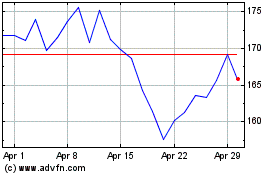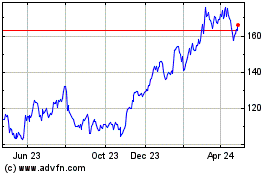China Set to Approve Qualcomm Purchase of NXP Semiconductors -- Update
May 26 2018 - 10:05AM
Dow Jones News
By Yoko Kubota in Guiyang and Lingling Wei in Beijing
Chinese authorities are set to approve Qualcomm Inc.'s planned
$44 billion acquisition of Netherlands-based NXP Semiconductors NV
in the next few days, according to people familiar with the matter,
in what would be another significant step toward easing frayed
U.S.-China trade relations.
China's State Administration for Market Regulation, which has
been conducting the antitrust review, will hold a meeting on the
matter Monday, according to the people. They said a contingent of
Qualcomm's legal team arrived in Beijing this weekend to hammer out
final details.
Approval would remove the last hurdle for a deal that has been
stuck for months amid U.S.-China trade tensions, but one of the
people said it could come with conditions. Chinese regulators have
expressed concerns that the merged company would crowd out domestic
businesses in areas such as mobile payments. NXP offers technology
and services used for mobile payments.
The likely approval comes as the Trump administration is
battling Congress to roll back penalties on Chinese
telecommunications giant ZTE Corp., and as U.S. Commerce Secretary
Wilbur Ross prepares to lead an interagency delegation to Beijing
starting June 2, where he is set to meet China's chief economic
envoy, Liu He.
The acquisition of NXP is considered critical for San
Diego-based Qualcomm, which is dominant in smartphone chips but is
looking for growth in other areas. Among NXP's products are chips
for automobiles, a rapidly expanding sector as more technology is
packed into cars.
Qualcomm had been waiting for Beijing's approval to proceed with
the purchase of the Dutch company, having secured permission from
the eight other major antitrust regulators around the world.
A spokesman for China's Commerce Ministry said last month that
the agency had conducted a preliminary review of the Qualcomm
deal's impact on competitors and the market, and had found "issues
that are hard to resolve, making it difficult to eliminate the
negative impact."
The State Administration for Market Regulation couldn't be
reached immediately for comment.
On Saturday, Qualcomm's President Cristiano Amon spoke at the
Big Data Expo in Guiyang, southern China. While he didn't touch on
the company's plan to acquire NXP, he emphasized Qualcomm's
commitment to China. "China is very important for Qualcomm," he
said. "We're rooted in China, we have developed a number of very
strong partnerships. Nothing can separate us from China."
China had been holding up reviews of multibillion-dollar
takeovers as leverage as Beijing seeks to fend off the Trump
administration's trade offensives. But since earlier this month,
when President Donald Trump said in a tweet that he would step in
to get ZTE back into business, Beijing has shown a willingness to
ease the regulatory roadblocks faced by U.S. companies.
Last week, China approved U.S. private-equity firm Bain
Capital's $18 billion purchase of Toshiba Corp's memory-chip unit,
a move seen as a gesture of goodwill as President Xi Jinping's
economic envoy, Mr. Liu, was visiting Washington for trade talks.
That same week, China's Vice President Wang Qishan told a group of
visiting foreign business representatives, including a Qualcomm
executive, that the Qualcomm and NXP deal stood a good chance of
being approved by Chinese regulators, according to people with
knowledge of the meeting.
The U.S. and its allies have been pressing Beijing to green
light the deal. U.S. trade negotiators raised the issue with Mr.
Liu recently in Washington, people briefed on the talks said.
Chancellor Angela Merkel of Germany also lobbied for the deal in
her meeting with Mr. Xi this week, according to a person with
knowledge of the matter.
In the case of ZTE, the Trump administration is now working to
ease U.S. sanctions that had threatened to shutter China's
second-largest telecom-equipment maker and the fourth-largest
vendor of mobile phones in the U.S.
The U.S. Commerce Department last month banned U.S. companies
from supplying the Chinese company for failing to live up to the
terms of an agreement over ZTE's evasion of sanctions on sales to
Iran and North Korea. Qualcomm was one of ZTE's key suppliers.
But Trump administration officials have been trying to negotiate
a reprieve, saying that they never intended to put ZTE out of
business and noting that the action is also hurting U.S. firms that
supply ZTE.
That has drawn a backlash from Democratic lawmakers who say
ZTE's violations were serious and should be punished.
The developments come as both sides appear to be retreating from
the brink of trade war, declaring a truce amid ongoing
negotiations. China has agreed to buy more U.S. farm products,
energy and services, and last week said it would slash tariffs on
imported cars from 25% to 15% starting July 1.
--
Yang Jie
contributed to this article.
Write to Yoko Kubota at yoko.kubota@wsj.com and Lingling Wei at
lingling.wei@wsj.com
(END) Dow Jones Newswires
May 26, 2018 09:50 ET (13:50 GMT)
Copyright (c) 2018 Dow Jones & Company, Inc.
QUALCOMM (NASDAQ:QCOM)
Historical Stock Chart
From Mar 2024 to Apr 2024

QUALCOMM (NASDAQ:QCOM)
Historical Stock Chart
From Apr 2023 to Apr 2024
